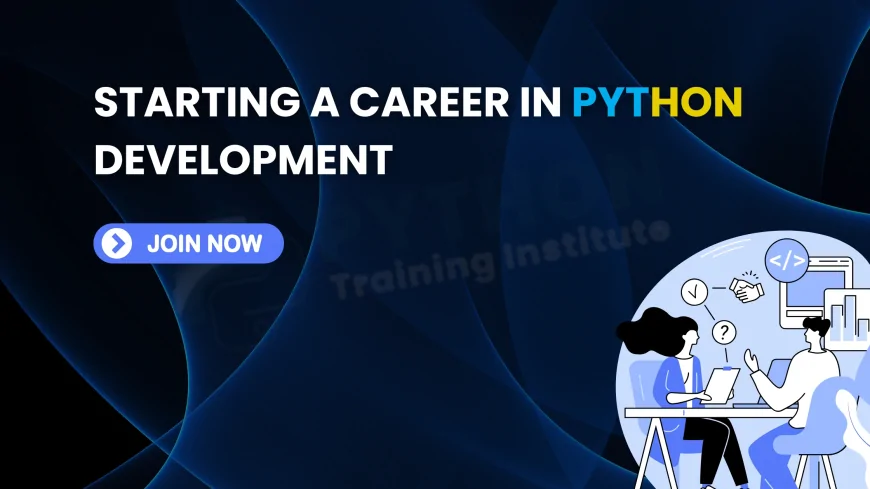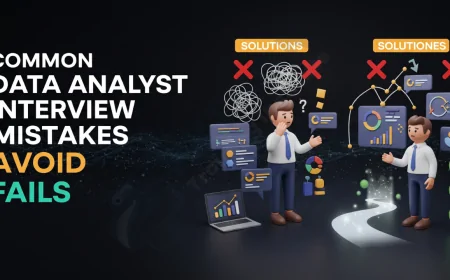How to Start a Career in Python Development
Learn how to start a career in Python development. Explore skills, tools, job roles, salaries, certifications, and step-by-step roadmap.

Table of Contents
- Why Choose Python as a Career?
- Essential Skills for Python Developers
- How to Start Learning Python
- Must-Know Tools & Frameworks
- Build Real-World Projects
- Python Developer Career Paths
- How to Find Python Developer Jobs
- Average Salary of Python Developers
- Top Certifications for Python Developers
- Frequently Asked Questions
- Conclusion
Why Choose Python as a Career?
Python is a beginner-friendly language known for its readability and simplicity. It is used in web development, data science, machine learning, automation, and more. Its versatility makes it an excellent career choice in 2025 and beyond.
- High demand across industries
- Open-source and community-driven
- Easy syntax for beginners
- Powerful for AI, ML, and data science
Essential Skills for Python Developers
To become a successful Python developer, you should focus on the following technical and soft skills:
- Core Python (Data types, loops, functions, OOP)
- Web frameworks like Django or Flask
- Understanding of APIs and RESTful services
- Version control using Git
- Basic front-end (HTML, CSS, JavaScript) knowledge
- Problem-solving and logical thinking
How to Start Learning Python
You can start learning Python through a mix of online courses, books, and practice. Here’s a structured approach:
- Learn basic syntax and run Python scripts
- Practice simple programs (calculator, to-do list, etc.)
- Understand data structures (lists, dicts, tuples)
- Learn object-oriented programming (OOP)
- Explore libraries like NumPy, Pandas, Matplotlib
- Work on mini-projects to gain confidence
Must-Know Tools & Frameworks
As you grow, learning tools and frameworks is essential. Here’s a list you should consider:
| Tool/Framework | Purpose |
|---|---|
| PyCharm / VS Code | IDE for writing Python code |
| Flask / Django | Web development |
| NumPy / Pandas | Data manipulation |
| Matplotlib / Seaborn | Data visualization |
| Jupyter Notebook | Interactive coding |
| Git & GitHub | Version control & collaboration |
Build Real-World Projects
Project-based learning is the fastest way to grow. Here are some ideas:
- Weather App using Flask and API
- To-Do List with Django and SQLite
- Web Scraper with BeautifulSoup
- Portfolio Website using Flask
- Machine Learning Model for House Prices
Python Developer Career Paths
Python offers diverse roles depending on your interests and specialization:
| Job Role | Primary Skills |
|---|---|
| Web Developer | Django, Flask, HTML/CSS |
| Data Analyst | Python, Pandas, SQL |
| Machine Learning Engineer | Python, Scikit-learn, TensorFlow |
| Automation Engineer | Selenium, PyAutoGUI |
| DevOps / Cloud Engineer | Python, Docker, AWS |
How to Find Python Developer Jobs
Here are the best ways to find your first Python job:
- Create a strong GitHub portfolio
- Use platforms like LinkedIn, Indeed, Naukri
- Contribute to open-source projects
- Participate in coding competitions and hackathons
- Apply for internships and freelance work
Average Salary of Python Developers
Salaries vary depending on experience, location, and company. Here’s an approximate guide:
| Experience Level | Average Salary (India) |
|---|---|
| Fresher (0-1 year) | ₹3.5 – ₹6 LPA |
| Mid-Level (2-5 years) | ₹7 – ₹15 LPA |
| Senior (5+ years) | ₹15 – ₹30+ LPA |
Top Certifications for Python Developers
- Certified Entry-Level Python Programmer (PCEP)
- Certified Associate in Python Programming (PCAP)
- Google IT Automation with Python (Coursera)
- Microsoft Python Certification
- edX Python for Data Science
Frequently Asked Questions (FAQs)
1. Is Python good for beginners?
Yes, Python’s simple and readable syntax makes it an ideal first programming language for beginners.
2. How long does it take to become job-ready in Python?
It usually takes 6 to 12 months of consistent learning and hands-on practice to become job-ready in Python.
3. Do I need a computer science degree to get a job in Python development?
No, many companies hire candidates based on skills, certifications, and real-world projects rather than formal degrees.
4. What are the top companies hiring Python developers?
Top companies like Google, Amazon, Microsoft, Infosys, and TCS regularly hire Python developers.
5. Which industries use Python the most?
Python is widely used in tech, finance, healthcare, education, data science, and AI-driven industries.
6. What are the best platforms to learn Python online?
Top platforms include Coursera, Udemy, edX, Codecademy, and freeCodeCamp.
7. What Python frameworks should I learn for web development?
Django and Flask are the most popular Python frameworks for building web applications.
8. Can I work as a Python freelancer?
Yes, platforms like Upwork, Freelancer, and Fiverr offer many freelance Python development opportunities.
9. How much can a Python developer earn in India?
Entry-level developers earn ₹3.5–6 LPA, mid-level earn ₹6–12 LPA, and experienced developers can earn ₹20+ LPA.
10. Which database is commonly used with Python?
Popular databases include MySQL, PostgreSQL, SQLite, and MongoDB when working with Python.
11. What are some real-world projects I can build to improve my Python skills?
Projects like a blog website, weather app, stock market analyzer, and automation scripts are great to showcase skills.
12. What soft skills are important for Python developers?
Problem-solving, communication, collaboration, and time management are essential soft skills.
13. Can Python be used for mobile app development?
Yes, using frameworks like Kivy and BeeWare, though it’s less common than web or data applications.
14. What are the best Python certifications?
PCEP, PCAP, and Google IT Automation with Python are valuable certifications for your resume.
15. Is Python enough for full-stack development?
With Django or Flask for the backend and some knowledge of HTML/CSS/JS, Python can be used in full-stack development.
16. How important is Git for Python developers?
Very important. Git helps in version control, collaboration, and project management.
17. What is the difference between Python 2 and Python 3?
Python 3 is the latest version with modern features, and Python 2 is now deprecated and no longer supported.
18. Can I learn Python without prior programming knowledge?
Absolutely. Python is designed to be beginner-friendly and is often recommended as the first language.
19. What is the future of Python in the tech industry?
Python’s future is strong due to its use in AI, machine learning, data science, automation, and web development.
20. How do I keep improving after learning the basics of Python?
Build complex projects, contribute to open-source, explore advanced topics, and stay updated with Python communities.
Conclusion
Starting a career in Python development is one of the smartest choices you can make in today’s technology-driven world. Python’s versatility, simplicity, and massive community support make it an excellent language for beginners and professionals alike. Whether you're interested in web development, data science, artificial intelligence, or automation, Python offers endless career opportunities across industries.
To succeed, focus on mastering core Python concepts, build real-world projects, explore frameworks like Django and Flask, and stay updated with the latest industry trends. Equip yourself with in-demand tools, contribute to open-source, and don’t hesitate to showcase your skills through a strong resume and portfolio.
With dedication, continuous learning, and a strategic approach, you can build a successful and fulfilling career as a Python developer. So, start coding today — your future in Python development is just a few lines of code away!
What's Your Reaction?
 Like
0
Like
0
 Dislike
0
Dislike
0
 Love
0
Love
0
 Funny
0
Funny
0
 Angry
0
Angry
0
 Sad
0
Sad
0
 Wow
0
Wow
0














